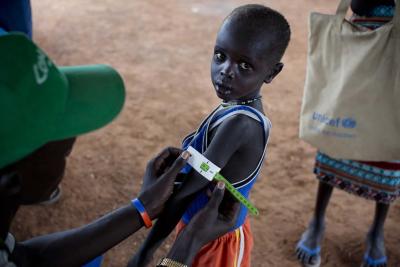

by Amanda Froelich, True Activist
Aid agencies report that 40% of the country's citizens require "urgent help," and warn that millions are at risk of dying within the next six months.
On Tuesday, UN-based organizations the World Food Programme, UNICEF, and the Food and Agriculture Organization (FAO) issued a famine declaration at a news conference in Juba, South Sudan. Reportedly, people are already dying of hunger and another 1 million people are on the brink of famine. The crisis has affected almost 5 million people, more than 40% of the country’s population.
In effect, the area is in urgent need of help, say the aid agencies. According to Joyce Luma of the World Food Programme, the famine in Sudan is largely “man-made” and is an effect of political turmoil that has engulfed the country since 2013. Serge Tissot of the Food and Agriculture Organization of the United Nations commented:
“Our worst fears have been realized. Many families have exhausted every means they have to survive.”
Because of the hardship, survivors have no choice but to scavenge for food. Emma Jane Drew, Oxfam’s humanitarian program manager in South Sudan, noted in a statement that “People have been pushed to the brink” and are essentially surviving on what they can find to eat in swamps.
“Vulnerable people, out of reach of life-saving assistance due to the conflict, are paying the ultimate price,” she added.

Credit: LATimes
Though the famine was only recently announced, the conundrum in South Sudan has been escalating for years. “Food insecurity, hunger, malnutrition has been getting steadily worse since the conflict started three years ago,” explained George Fominyen, a spokesperson for the UN food program. The issue is, humanitarian groups have had large difficulty reaching the hardest-hit areas.
“We have to talk to 10 to 15 people and ask if it’s possible to send a team there,” he said. “You cannot just access these places without prior agreement.”
Unless “a substantial injection of funds” – approximately $205 million – is secured within the next six months, the UN food program’s supplies will run out.
“We are quite concerned that we do not have the resources,” Fominyen confessed. “We could run out of food by the end of June. The needs are so huge; every time you are entering a new front, a new battle.”
Much is heard about the Syrian refugee crisis, but what few know is that Africa is experiencing it’s largest refugee crisis as South Sudan citizens flee the civil war in their homeland and migrate to Uganda. 1.5 million people fled Sudan just last week, offering perspective on how the situation is worsening.
#SouthSudan: People pushed to the brink of survival as #famine hits, women & children worst affected: https://t.co/NHHQ3CVunq pic.twitter.com/E3W3IavlSA
— Oxfam International (@Oxfam) February 20, 2017
South Sudan, which is a relatively new nation, experienced a starvation before. NZHerald points out that in 1998, a famine occurred in the region of Bahr El Ghazal after an extended drought and fighting between government forces and rebels. Officials now warn that an “all-out ethnic civil war” could soon occur.
This article (Famine Declared In South Sudan As 100,000 People Face Starvation) is free and open source. You have permission to republish this article under a Creative Commons license with attribution to the author and TrueActivist.com
http://www.trueactivist.com/famine-declared-in-south-sudan-as-100000-people-face-starvation/

